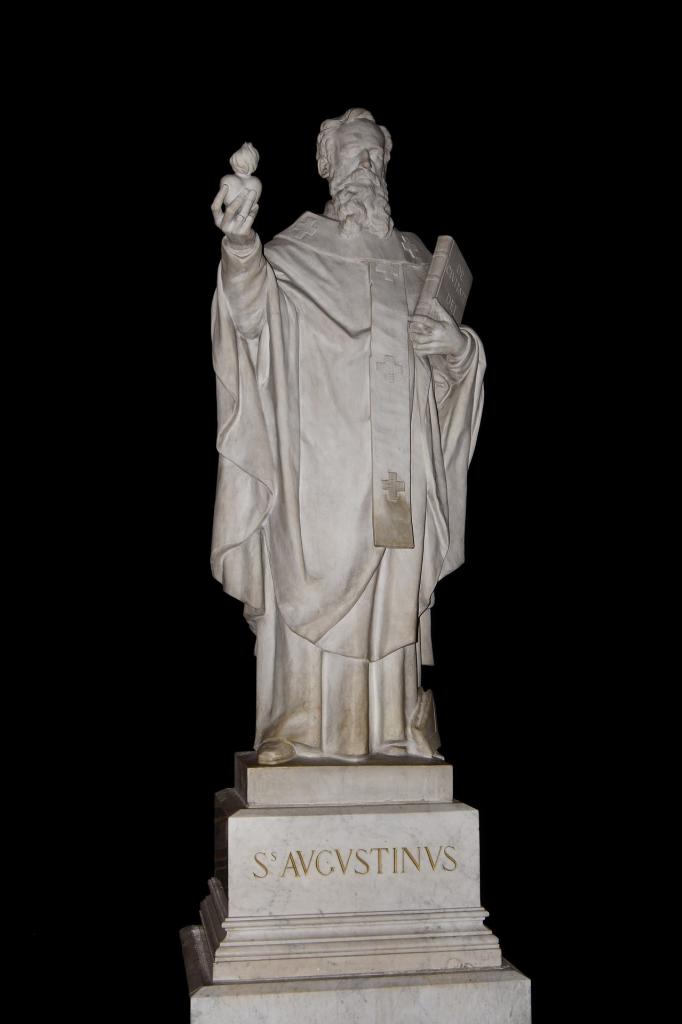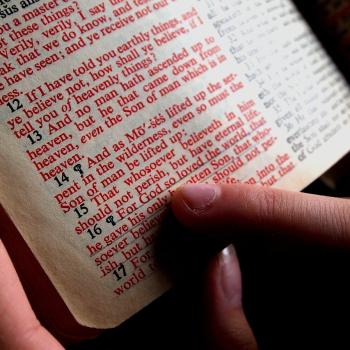Apart from his celebrated works, Confessions and The City of God, Saint Augustine of Hippo also influenced many theologians in the West with his view of doctrines such as original sin, grace, election, and predestination. He likewise commented on many verses in Romans. In this third instalment of the Romans 9 debate, we will notice that Augustine’s earlier interpretation on subjects relevant to Rom 9 do not always agree with those of his later writings.
Earlier Augustine: God Chooses by Foreknowing Those who Would Believe in Him
Augustine wrote a transcript that answers questions on Romans to help clergy from Carthage, Africa. This work is known as his Commentary on Statements in the Letter of Paul in Romans (c. 394). On Romans 9:11–13 regarding God loving Jacob but hating Esau he writes: “God did not elect anyone’s works (which God himself will grant) by foreknowledge, but rather by foreknowledge he chose faith, so that he chooses precisely him whom he foreknew would believe in him; and to him he gives the Holy Spirit, so that by doing good works he will as well attain eternal life” (Romans 61.11).
 As Paula Fredriksen affirms, Augustine claims in this work that “God thus chose Jacob because he foreknew that he would respond with good will to his call, which Esau would spurn; he hardened Pharaoh [Rom 9:14–18], foreknowing the infidelity that would greet his call. (exp. prop. Rm. 55, 60–62).”[2]
As Paula Fredriksen affirms, Augustine claims in this work that “God thus chose Jacob because he foreknew that he would respond with good will to his call, which Esau would spurn; he hardened Pharaoh [Rom 9:14–18], foreknowing the infidelity that would greet his call. (exp. prop. Rm. 55, 60–62).”[2]
Divine justice in this passage is thus protected from arbitrariness, according to Fredriksen. Augustine writes in another work that Pharaoh deserved his hardened heart due to infidelity, and thus Pharaoh is responsible for his own hardening (On 83 Varied Questions, 62).[3]
It is evident from these passages that Augustine’s earlier view on election and predestination are comparable with other early church fathers (see the previous instalment). He claims that God foreknew human faith and chose on that basis. He also seems to reject election by foreknowledge of works. The patristic exegetes understood this foreknowledge as prescience rather than philosophical determinism.
This is simple foreknowledge in which God knows of human faith and actions ahead of time; it does not mean that God controls that faith or those actions. As well, and unlike some modern interpreters, the church fathers did not seem to interpret God’s foreknowledge as forelove. Such a view essentially reinterprets foreknowledge as God’s pre-choice and thus absorbs foreknowledge into prior election.
Later Augustine: Grace Comes Before the “Merits of Faith”
Augustine, however, changed his viewpoint on Romans 9 to stress the importance of grace over human will. Just a few years after his work on Romans, when writing to Bishop Simplicianus of Milan, he claims that the divine call precedes rather than follows merits. And election is not based on foreknowledge since that would imply merit (Ad Simplicianum 2).
On Rom 9:11–13 Augustine claims: “No one believes who is not called. God calls in his mercy and not as rewarding the merits of faith. The merits of faith follow his calling; they do not precede it.… Unless the mercy of God in calling precedes faith, no one can even believe and thus begin to be justified and to receive the power to do good works. So grace comes before all merit. Christ died for the ungodly. The younger [Jacob] received the promise that the elder [Esau] should serve him from the God who called him and not from any meritorious works of his own” (Ad Simplicianum 1.2.1).[4]
For Augustine, as Mathijs Lamberigts suggests, “God’s choice of one person over another took place on the basis of his judgment made before time: that God chose Jacob over Esau was not based on his foreknowledge of their future deeds; rather, it was grounded in his own, autonomous decision ([Ad Simplicianum] 1.2.8), which is beyond human understanding (cf. 1.2.16); this, according to Augustine, was also Paul’s opinion in Romans 11:33.”[5] Nevertheless, God did not “do” something to make Esau and Pharaoh evil. His choice of not having mercy on them is simply “the privation of compassion.” Though as Mark Reasoner puts it, “it is still God who is ultimately responsible.”[6]
Augustine also affirms that God neither called all Jews nor all gentiles; only some of them. He writes: “From Adam has sprung one mass of sinners and godless men, in which both Jews and Gentiles belong to one lump, apart from the grace of God. If the potter out of one lump of clay makes one vessel for honor and another for dishonor [Rom 9:21], it is clear that God has made of the Jews some vessels for honor and others for dishonor, and similarly of the Gentiles” (Ad Simplicianum 1.2.19).
The rationale for God’s freedom to choose some rather than others is itself an act of mercy according to Augustine, since all humans had sinned in Adam (Rom 5:12). James Wetzel explains: “In Ad Simplicianum Augustine appeals to universal depravity in an attempt to dispel the appearance of divine injustice. As part of a common clump of sin (massa peccati), human beings all merit damnation and so are owed no favor from God. The key elements of Augustine’s eventual doctrine of original sin—inheritance of sin (tradux peccati) and original guilt (originalis reatus)—are already at work here (1.2.20).”[7]
Enter Pelagius
The ancient British theologian Pelagius came against the interpretation of original sin, predestination, and human bondage of the will typified by Augustine in Ad Simplicianum and other writings. Pelagius argued that God neither condemns the unavoidable nor violates human freedom, but “emphasized that natural capability must be brought to recognition and then be exercised through free choice.”[8] In his own commentary on Romans, Pelagius seems to follow the lead of Origen by attributing the claims made in Rom 9:14–19 to a representative opponent against Paul’s view.[9]
Pelagius also repudiates that humans sinned in Adam’s sin so as to inherit Adam’s guilt. Rather, in Rom 5:12–20, Adam influences the following generations by way of example. Whenever humans follow that example and make their own choice to sin, they will suffer the consequence of spiritual death. Augustine fired back with works such as, “A Work on the Proceedings of Pelagius,” “On Nature and Grace, against Pelagius,” and “A Treatise against Two Letters of the Pelagians.”[10] As later decades and councils would evince, Augustine’s view won the day and age in Western churches.
A few years before his death, Augustine wrote Retractions, a work that pointed out the teachings in his earlier years that he now wished to clarify, correct, or change. In relation to his Romans commentary when it came to Jacob and Esau in Rom 9:13, he writes, “I had not yet carefully examined, nor up to that point had I found, what sort of thing grace’s choosing might be, of which the same Apostle says, A remnant was saved through grace’s choosing (Rom 11:15). It is not grace, to be sure, if any merits precede it [grace], so that what is given is paid back on account of merits, not in accordance with grace but as something owed, rather than as a gift” (Retractions 1.22.2).[11] In reference to writing to Simplicianus about Romans 9, Augustine says, “In answering this question I in fact strove on behalf of the free choice of the human will, but God’s grace conquered” (Retractions 2.1).[12]
Reflections
Whereas the earlier works of Augustine affirm that God elects on the basis of God’s foreknowledge of human faith, Augustine appears to deny this in his later writings. This type of election based purely on God’s gracious choice influenced later theologians in the West including the Reformers.
For many Western churches Romans 9 provides a strong reading of being divinely chosen by grace. The Eastern Orthodox Church, on the other hand, has maintained the view of early church fathers and early Augustinian writings by accepting election on the basis of divine foreknowledge. Lamberigts asserts that the later Augustine maintained that God did not want everyone saved, this he finds in conflict with 1 Timothy 2:4 where God wants all to be saved.[13] All the same, it is difficult to fault Augustine for stressing the importance of God’s grace.
We probably should not settle any issue in Romans 9 purely on the ground of patristic witnesses. How did later interpreters read this chapter? Stay tuned!
Notes
[1] Paula Fredriksen Landes, ed. Augustine on Romans (Chico, Calif.: Scholars Press, 1982), 33.
[2] Paula Fredriksen, “Expositio Quarundam Propositionum Ex Epistula Apostoli Ad Romanos.” In Allan D. Fitzgerald, ed., Augustine through the Ages: An Encyclopedia (Grand Rapids, MI; Cambridge, U.K.: William B. Eerdmans, 1999), 346 (henceforth, ATAE)
[3] See Mark Reasoner, Romans in Full Circle: A History of Interpretation (Louisville: Westminster John Knox, 2005), 97–98.
[4] Translation from Gerald Bray, Romans, rev. ACCS 6 (Downers Grove, IL: IVP, 1998).
[5] Mathijs Lamberigts, “Predestination,” in ATAE, 678.
[6] Reasoner, Romans in Full Circle, 98, in reference to Ad Simplicianum 2.15–16.
[7] James Wetzel, “Simplicianum, Ad,” in ATAE, 798–99. See also Otto Kuss, “Römer zu der Problematik um die Praedestination,” in Kuss, Der Römerbrief übersezt und erklärt (Regensburg, 1978), 3: 828–936 (833–36).
[8] Eugune TeSelle, “Pelagius, Pelagianism,” in ATAE, 635; cf. 634.
[9] See his commentary there and 117 n. 13 in the translation by Theodore De Bruyn, Pelagius’s Commentary on St Paul’s Epistle to the Romans (Oxford: Clarendon, 1993). On Augustine in Pelagius, see De Bruyn’s Introduction, 18–24, 40–42.
[10] Augustine also further advanced his doctrines in treatises such as, “On Grace and Free Will (De Gratia et Libero Arbitrio), “On Rebuke and Grace” (De Correptione et Gratia), “On the Grace of Christ and on Original Sin,” (De Gratia Christi, et de Peccato Originali); “On the Predestination of the Saints,” (De Praedestinatione Sanctorum), and “On the Gift of Perseverance” (De Dono Perseverantiae).
[11] Augustine, Revisions, ed. R. J. Teske & B. Ramsey; B. Ramsey, Trans. (Hyde Park: New City Press, 2010), I/2:93.
[12] Augustine, Revisions (Ramsey tr.).
[13] Lamberigts, “Predestination,” 679.
Image: Saint Augustine Statue via pixabay.com













